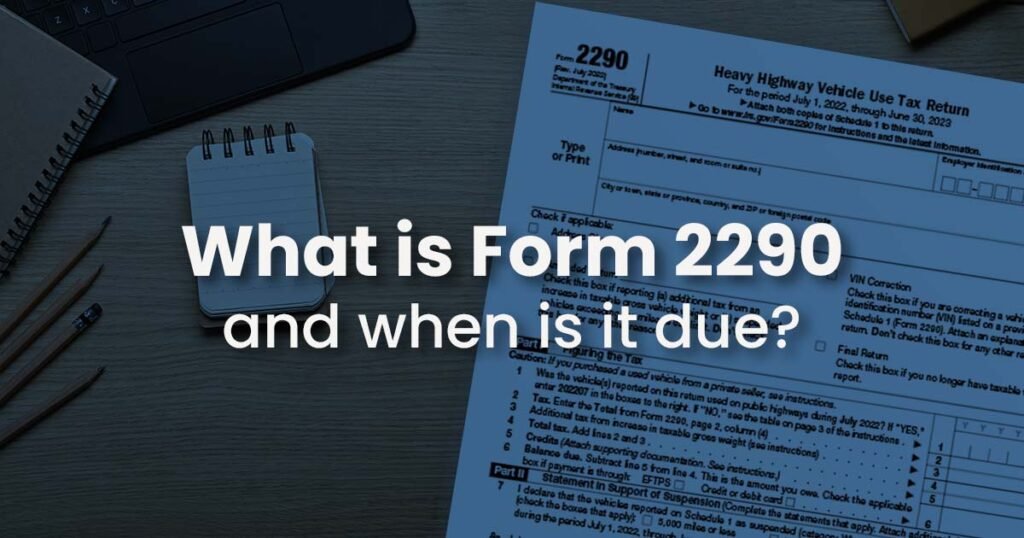Truck Tax 2290

Truck Tax 2290: A Comprehensive Guide for 2025
If you operate a heavy vehicle on public highways, chances are you’re familiar with IRS Form 2290, often referred to as the “truck tax.” This annual tax is crucial for compliance and helps maintain the nation’s roads. Here’s an in-depth look at what the truck tax is, who needs to pay it, and how to ensure you meet your obligations in 2025.
What Is Truck Tax 2290?
Truck Tax 2290, officially called the Heavy Vehicle Use Tax (HVUT), is a federal excise tax applied to heavy vehicles with a gross weight of 55,000 pounds or more. The tax is designed to contribute to road maintenance and repair, as heavy vehicles place extra strain on highways.
Who Needs to File?
You must file Form 2290 if:
Your vehicle weighs at least 55,000 pounds.
The vehicle is expected to travel over 5,000 miles during the tax year (7,500 miles for agricultural vehicles).
You purchased a heavy vehicle and plan to register it for use on public roads.
Exemptions may apply to certain vehicles, such as those owned by government entities or used below the mileage threshold.
Filing Deadlines
The truck tax year runs from July 1 to June 30. For most taxpayers, the deadline to file is August 31 each year. However, if you begin using a vehicle after July, you must file by the last day of the month following the first month of use.
For example, if you start using your truck in January 2025, your filing deadline will be February 29, 2025.
How Is the Tax Calculated?
The tax amount depends on the vehicle’s weight and mileage. Here’s how it breaks down:
Vehicles weighing 55,000 pounds pay a minimum tax of $100.
For every additional 1,000 pounds above 55,000, there’s an added tax of $22, with a maximum tax of $550.Vehicles traveling under 5,000 miles or used for agricultural purposes may qualify for reduced rates or exemptions.
How to File Form 2290?
Prepare Your Information
Gather key details, including:
Your Employer Identification Number (EIN)
Vehicle Identification Number (VIN)
The vehicle’s gross weight
Choose a Filing Method
Electronic Filing (E-filing): Required if filing for 25 or more vehicles. It’s also the fastest way to receive proof of payment.
Paper Filing: Allowed for those filing for fewer than 25 vehicles, though processing takes longer.
Make Your Payment
Payments can be made via:
Direct debit from your bank account
The Electronic Federal Tax Payment System (EFTPS)
Check or money order
Obtain Proof of Payment
Once your filing is complete, you’ll receive Schedule 1, which serves as proof of payment. This document is necessary for registering your vehicle with the Department of Motor Vehicles (DMV).
Benefits of E-Filing
E-filing has become the preferred method for truckers and businesses due to its convenience and efficiency. Benefits include:
Speed: Get your Schedule 1 immediately after filing.
Error Reduction: Filing systems often catch mistakes before submission.
Accessibility: File from any location without mailing delays.
Recordkeeping: Digital records simplify tax tracking.
Penalties for Non-Compliance
Failing to file Form 2290 or pay the HVUT on time can lead to penalties:
Late Filing Penalty: 4.5% of the total tax due, assessed monthly for up to five months.
Late Payment Penalty: 0.5% of the unpaid tax amount, plus interest charges.
These penalties underscore the importance of meeting filing deadlines.
Frequently Asked Questions
1. Can I Get a Refund for an Unused Vehicle?
Yes, if a vehicle is sold, destroyed, or stolen during the tax year, you may be eligible for a refund or credit for unused months.
2. What If My Vehicle Doesn’t Exceed 5,000 Miles?
Vehicles operating under the mileage threshold are exempt from the tax. However, you still need to file Form 2290 to report the vehicle as “suspended.”
3. How Do I Correct Errors on Form 2290?
You can file an amended return to fix mistakes, such as incorrect VINs or changes in the vehicle’s taxable gross weight.
Key Takeaways
The truck tax, filed via Form 2290, is an essential requirement for heavy vehicle operators. Staying compliant ensures smooth business operations and helps maintain the roadways we all rely on. In 2025, consider e-filing to streamline the process and avoid unnecessary delays. If you’re unsure about filing or need assistance, consult a tax professional who specializes in HVUT. By meeting deadlines and accurately reporting your vehicles, you’ll avoid penalties and keep your operations running smoothly.
Stay compliant and drive forward confidently in 2025!






